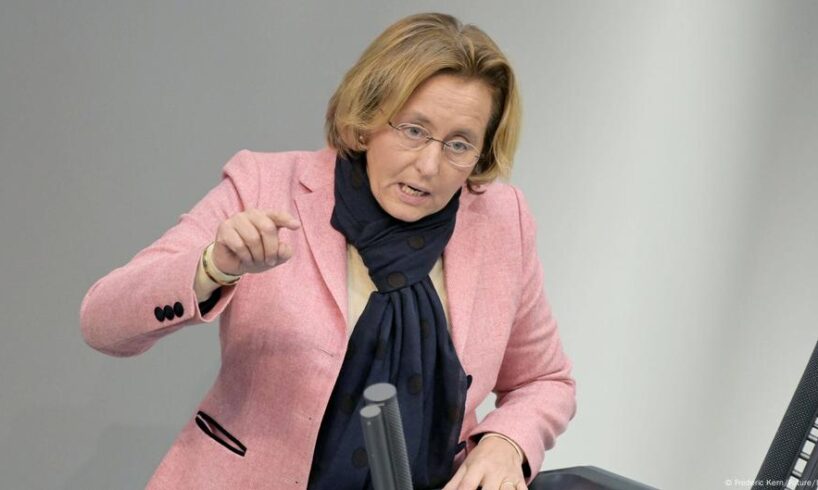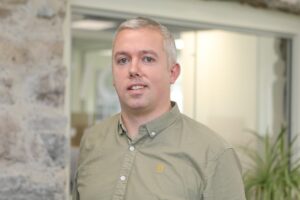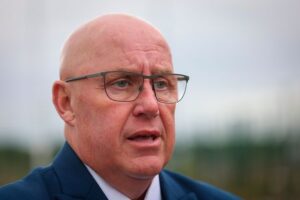
Beatrix von Storch, deputy chair of the far-right Alternative for Germany’s parliamentary group in the Bundestag, recently made headlines with her visit to the United States in September 2025. In Washington, von Storch confirmed she met Trump administration officials in a White House annex.
Her American counterparts reportedly included staff from the office of US Vice President JD Vance, plus representatives from the US State Department and National Security Council.
Von Storch described the talks on the platform X as “very open, constructive, and goal-oriented.”
Von Storch: ‘A very dangerous precedent’ (02.05.2025)
To view this video please enable JavaScript, and consider upgrading to a web browser that supports HTML5 video
Von Storch said her talks in Washington mainly centered on freedom of expression. In an interview with the Swiss radio station Kontrafunk following her visit, von Storch stated: “They are interested in the restrictions on freedom of speech and censorship in Germany.”
For the AfD, that has long been a central issue. However, what the party calls ‘restrictions on free speech’ are often court rulings against its politicians for breaking existing laws.
In 2024, Björn Höcke, the influential AfD state leader in the eastern state of Thuringia was fined twice for using slogans linked to the Nazi-era paramilitary group Sturmabteilung (SA) during campaign speeches. The AfD routinely dismisses such penalties as politically motivated.
Against migration, against ‘woke’ culture
The meeting between US officials and the German visitors seems to have focused on German domestic politics, with the AfD using the moment to promote its agenda. “They know that the AfD is the party that aligns broadly with Trump’s government policies,” von Storch told Kontrafunk. She named common positions such as: “Against Islamization, against migration, against woke culture.”
During the last federal election campaign, the AfD received notable backing from the United States. In a widely discussed speech at the Munich Security Conference, US Vice President JD Vance called for closer cooperation between German parties and the radical right-wing AfD.
Shortly before the February German federal elections, Elon Musk — then a close ally of Trump, and a multibillionaire — appeared via livestream from the US at the AfD party congress. Amid enthusiastic applause from party supporters, he also voiced his support for the AfD.
Analyst: US technocrats’ liking for AfD is driven by profit
To view this video please enable JavaScript, and consider upgrading to a web browser that supports HTML5 video
AfD sees the US as the birthplace of the immigration society
Political scientist and expert on right-wing extremism Armin Pfahl-Traughber is cautious about how such meetings might affect US-German relations. He doesn’t expect the AfD to gain wider political influence: “At present, I don’t believe the American government will necessarily amplify this, because the AfD is not yet a major player in German federal politics,” he told DW.
Still, Pfahl-Traughber recognizes the domestic political value of these connections: “This rapprochement with the Trump administration amounts to a de facto elevation of the party.”
Inside the AfD, ties with the US have long been debated. In far-right circles, America is often seen as the birthplace of modern immigration society. Parties like the AfD typically blame migration for most societal problems.
Friends with Russia’s dictator Vladimir Putin
Many ideologues within the party have shown interest — some openly — in Russia’s authoritarian President Vladimir Putin and his hardline policies. For instance, his crackdown on the Russian LGBTQ+ movement is viewed positively within the AfD.
Pfahl-Traughber stresses that the AfD’s growing ties to the US shouldn’t be seen as a rapprochement with the country as a whole, but specifically with Trump’s America: “Trump’s United States clearly shares ideological commonalities with AfD positions.”
What both share is a deeply illiberal view of society — where free speech is defended only when it supports their own opinions. “Now that there are restrictions on media freedom in the US, I haven’t heard AfD party leader Alice Weidel call for ‘freedom of speech,” Pfahl-Traughber told DW. “But that’s the usual double standard, which is common in this political spectrum.”
After Beatrix von Storch’s visit to Washington, another AfD delegation traveled to Washington: Markus Frohnmaier, foreign policy spokesman for the AfD parliamentary group in the Bundestag, and AfD foreign policy expert Jan Wenzel Schmidt met with high-ranking Trump advisor Darren Beattie during a trip in early October.
This article was originally written in German.
While you’re here: Every Tuesday, DW editors round up what is happening in German politics and society. You can sign up here for the weekly email newsletter, Berlin Briefing.





